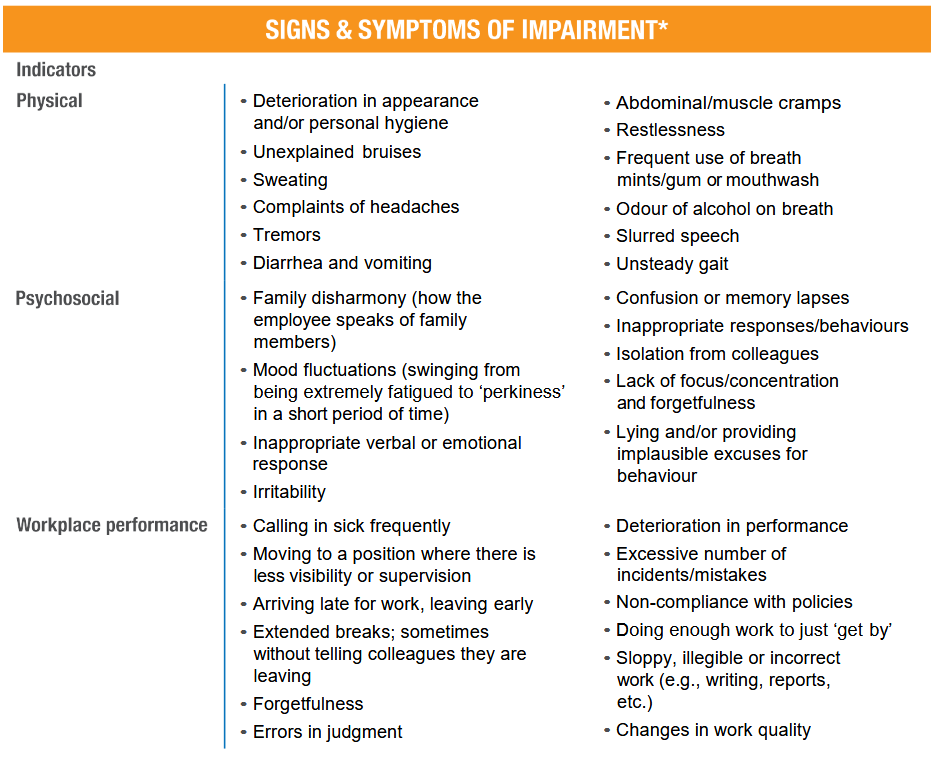
We often think of impairment as a result of substance use or in terms of addiction or dependence to alcohol or drugs (legal or illegal). However, impairment can be the result of various situations, such as side-effects from prescribed medication.
Impairment commonly refers to an altered state of physical and/or mental functioning. In a workplace context, someone who is impaired may have difficulty completing tasks in a safe manner and may put themselves, their co-workers, and the public in danger.
There are many potential causes of workplace impairment
- Substance use, including alcohol or other drugs (legal or illegal)
- Medication(s) with side-effects
- Personal problems or crisis
- Conflicts, harassment, bullying or violence at work
- Fatigue (working more than one job, shift work, long hours, new infant at home, etc.)
What are Employers’ responsibilities?
Currently, there is no specific provision addressing impairment in the workplace (in some provinces there are provisions for specific sectors). However, employers are required to develop and implement Hazard Prevention Programs to protect employees from workplace hazards, which may include policies related to impairment.
Because impairment may be the result of various circumstances, employers should clearly communicate expectations and fit for duty standards in their workplace policies and should provide training on those policies and expectations.
Remember that it is not the role of the employer to diagnose a medical issue, or possible substance use or dependency problem. Their role is to identify if an employee is impaired, and to take the appropriate steps as per the organization’s policy. Wherever possible, employers should rely on observation, supervision, and frequent face-to-face conversations as a way to recognize when an employee is impaired. However, when it comes to safety-sensitive* positions, employers must always use a safety-first approach.
*Safety-sensitive positions might include forklift operators, drivers, electricians, nurses, warehouse clerks, customer service representatives, maintenance personnel, etc. where impaired performance can cause direct and significant damage to property, and/or injury to the employee and others around them.
What should be done if impairment is suspected?
Since an employer can be found liable for irresponsible and negligent actions of employees who may be under the influence of a substance, it is important to understand what impairment looks like, and how to address impairment related issues when they arise in the workplace. If impairment is suspected, employers should consider if there is a risk to the individual’s safety or the safety of others. For example, while impaired:
- Does the person have the ability to perform the job or task safely (for example, driving, operating machinery, use of sharp objects, etc.)?
- Is there an impact on cognitive ability or judgment?
Employers must assess each situation on a case-by-case basis and consider if there are other side-effects of a medical condition or treatment that needs to be considered.
Random testing of employees in safety-sensitive positions may be permissible if the employer is able to show that there is a demonstrated alcohol or drug abuse problem and the safety benefits of testing outweigh potential intrusion into employee privacy. The employer must also meet its duty to accommodate employees who test positive.

Signs and symptoms may be different from person to person. Keep in mind that when used alone or in combination, they do not necessarily mean that the employee has a substance use problem.
Author: https://www.operationsafety.ca/
Sources:https://www.ccohs.ca/oshanswers/hsprograms/impairment.html
